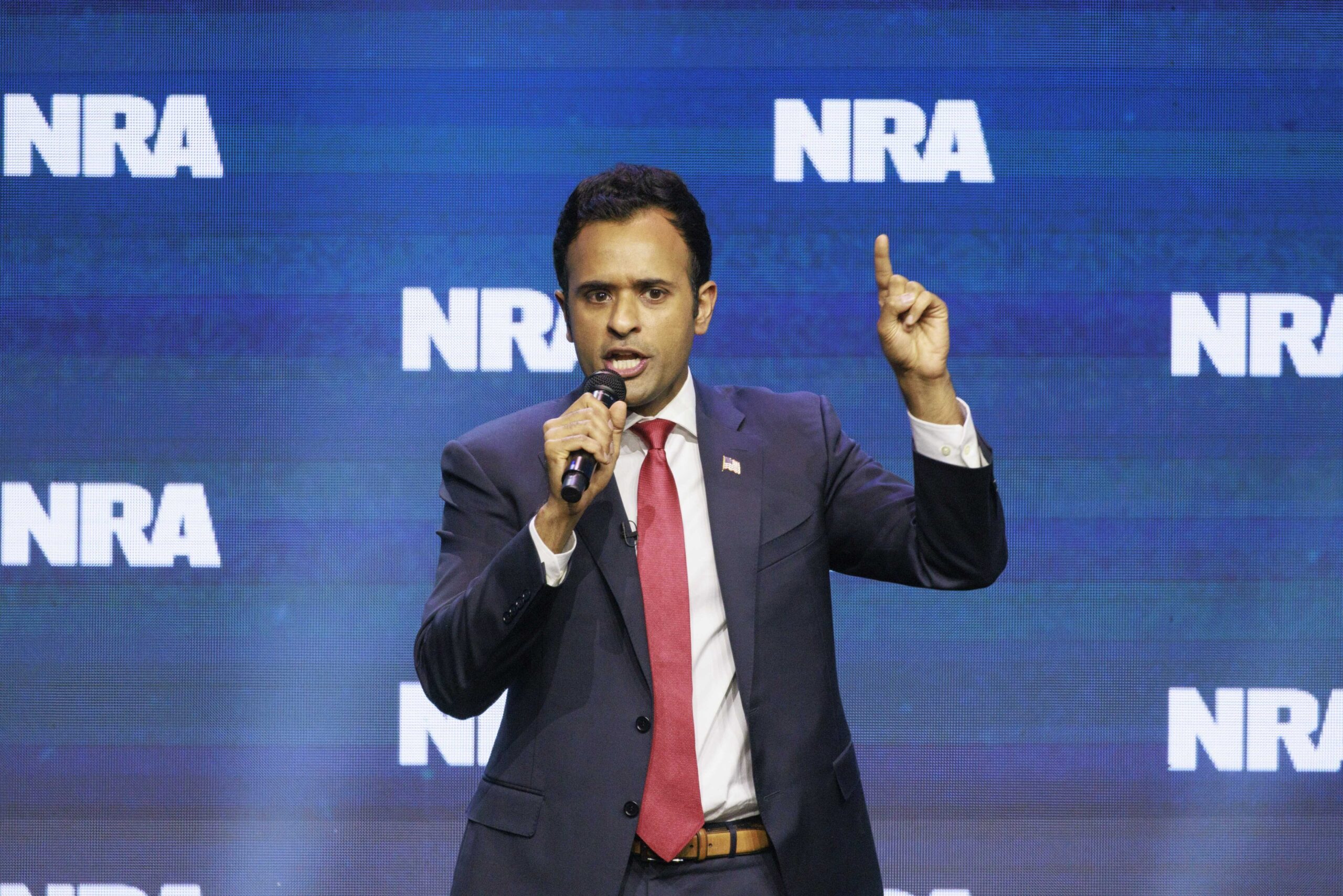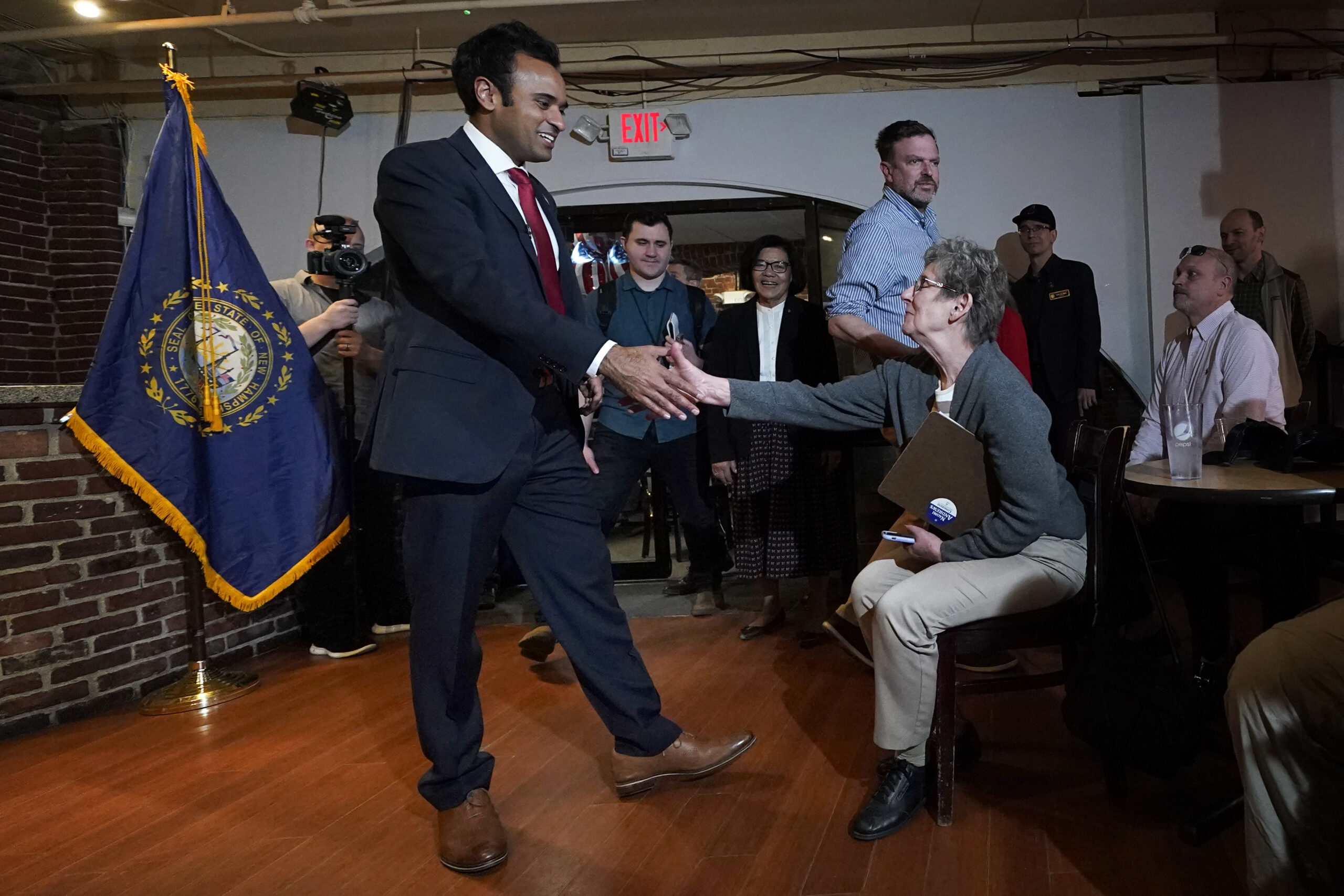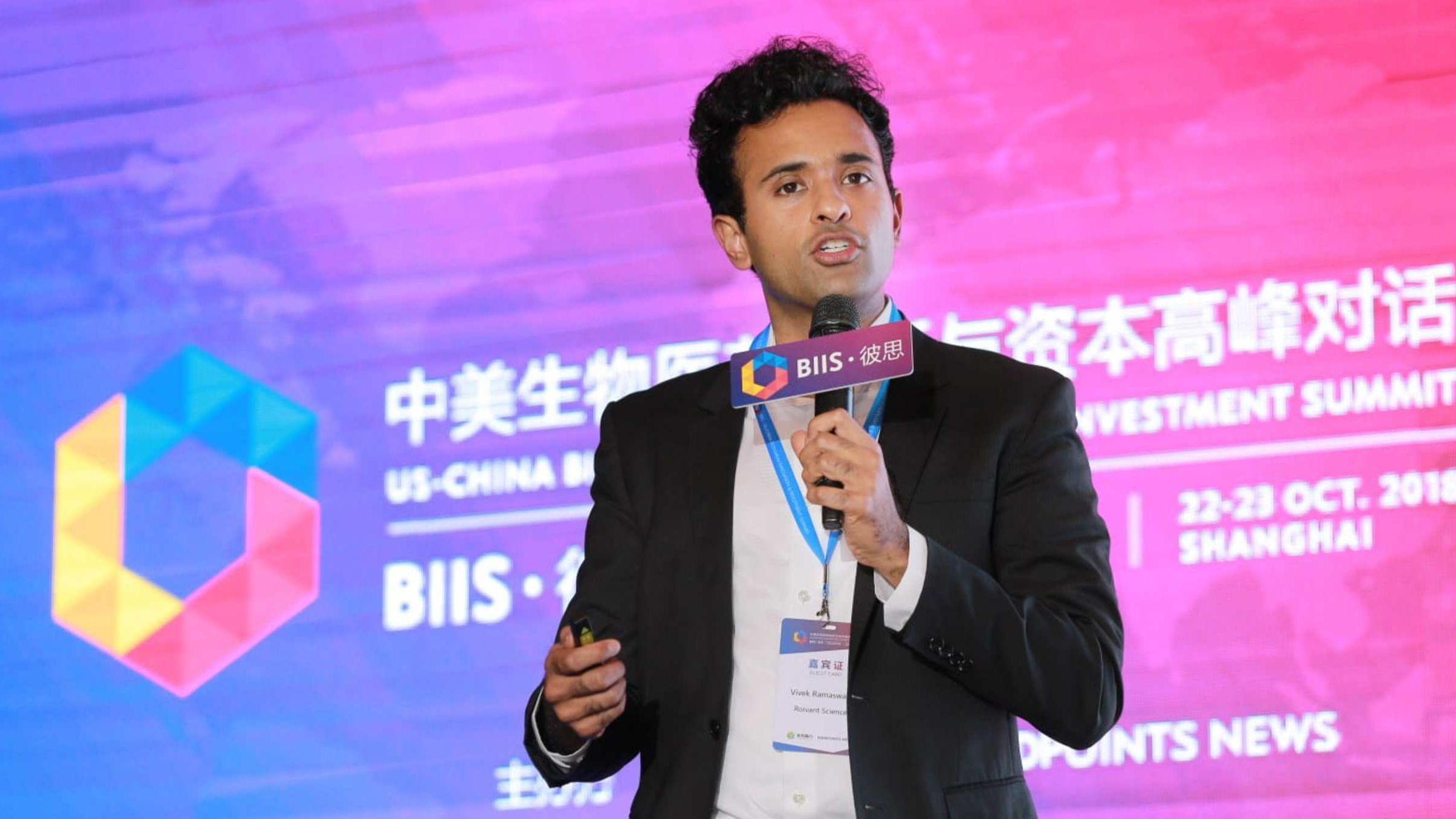
Vivek Ramaswamy is running an anti-“woke,” anti-China presidential campaign. It's a contrast to his time as CEO
WOLFEBORO, NH — Biotech entrepreneur Vivek Ramaswamy is running for president as an anti-ESG and China hawk, two themes he’s deployed early and often during his fledgling campaign to win over Republican primary voters.
But his positions as a candidate differ, sometimes substantially, from his stances just a few years ago, when he was CEO of the biotech company Roivant Sciences — a career that has contributed to the personal wealth he’s using to bankroll his campaign.
Corporate America’s focus on environmental, social and governmentally progressive business practices has been the subject of particular ire for Ramaswamy, 37. He’s described it as “woke” anti-capitalism that has made corporations into unofficial policymakers.
ESG is a “mechanism for the government to effectively deputize some of its tasks to be done through the back door, less transparently, what it couldn’t get done through the front door — be it on the climate change agenda, be it on racial equity agendas,” Ramaswamy told Endpoints News after a town hall campaign event in New Hampshire last month. “And I think that’s fundamentally wrong.”
But just three years prior, in 2020, Ramaswamy backed Roivant’s launch of an ESG investment arm.
Dubbed Roivant Social Ventures, or RSV, the fund aims to “generate substantial social returns and reinvest financial returns to drive long-term impact,” according to its website. Among its stated goals are increasing diversity in clinical trials, investing in and incubating early-stage biotechs to bring new drugs to underserved patient groups, and creating more diversity, equity and inclusion opportunities for biopharma leaders.
According to the CEO of Roivant Social Ventures, Lindsay Androski, Ramaswamy gave the go-ahead for the organization, and OK’ed its initial funding.
“Vivek is the person I initially pitched Roivant Social Ventures to, he gave me the green light to launch and lead it (including seed funding from Roivant), and he has always been supportive of the Roivant Social Ventures philanthropic model,” Androski told Endpoints in an email in February.
After the New Hampshire event, Ramaswamy downplayed his role and said the fund launched after he stepped down as CEO in January 2021. He called it “an interesting concept” that could move experimental drugs forward through a nonprofit if Roivant had already done due diligence and didn’t have to pay for any additional research. He said that’s where his interest ended.
“To tell you the truth, I couldn’t tell you today what Roivant Social Ventures does now,” Ramaswamy said. “I don’t know when it was aligned with that [ESG] mission.”
Roivant Social Ventures’ website lists its launch as 2020, the year before Ramaswamy stepped down as CEO, and the organization officially became a 501(c)3 that year, according to a letter from the IRS. In a follow-up email, Androski also said she spoke to Ramaswamy in “mid-2020.”
“We specifically spoke about the egregious hospitalization/death rates for Covid for Black and brown populations (which were all over the news at that time),” Androski wrote, “and how we should allow Roivant employees to engage in meaningful social projects using their professional expertise that can help improve access and outcomes for underserved groups.”
The fund had previously been known as the Roivant Foundation, which Ramaswamy said “originally had a different purpose.”
Vivek Ramaswamy shakes hands with a guest during a campaign stop in Manchester, NH (Charles Krupa/AP Images)
Click on the image to see the full-sized version
In New Hampshire, Ramaswamy spoke to a capacity crowd of about 80 at a Masonic lodge in the small town of Wolfeboro, about 45 minutes northeast of Concord. Campaign staffers handed out t-shirts and bumper magnets, and attendees ate a buffet dinner before Ramaswamy arrived. Once the town hall got underway, they peppered him with questions on topics ranging from Ukraine to the role of God in society.
Ramaswamy said that if he were president today, he wouldn’t give Ukraine “another dollar.” As a former pharmaceutical executive, he said “we can have some barroom debates” about whether ivermectin is an effective Covid treatment. He took shots at environmentalists, calling them a “climate cult” who are orchestrating a “hoax.” And when asked about the 2020 election and the false claims that it was stolen, Ramaswamy said Republicans would have to win 2024 in a landslide to ensure Democratic Party “shenanigans” don’t come into play.
One topic that came up frequently was China, which Ramaswamy calls his top foreign policy priority. He has said he would protect Taiwan by arming every household there with an AR-15 rifle, and that the US should be “willing to bar” companies from doing business with the country.
But as CEO, he steered his company into doing more, not less, business in China.
In 2017, he founded Shanghai-headquartered Sinovant, with the goal of “bringing innovative medicines to China and advancing Chinese biopharmaceutical innovation abroad,” according to a Roivant press release. He formally unveiled the company in July 2018 with three drug programs and recruited a team of Chinese researchers to spearhead its efforts.
Sinovant’s financial partner on the deal was Citic Private Equity, or CITIC PE, a subsidiary of the Chinese state-owned conglomerate Citic Group. Launched in 1979 during the leadership of Deng Xiaoping, Citic Group was China’s biggest state-run company as of 2019 and owns and invests in banks, airlines and new technologies.
Citic PE did not respond to a request for comment.
Endpoints attempted to ask Ramaswamy about Sinovant at the campaign event, after traveling to New Hampshire at the campaign’s invitation for an interview. But that conversation lasted just a few minutes, and the campaign didn’t respond to multiple follow-up emails seeking comment.
Another Roivant subsidiary located in Hong Kong, Cytovant, focused on cell therapies for China and other Asia-Pacific nations. Both subsidiaries, or “Vants” as they were billed, are no longer in operation after Roivant shut them down in 2021.
“Roivant is not currently active in China; Sinovant and Cytovant never generated sales or profits and are no longer operating,” a company spokesperson, Stephanie Lee, wrote in an email. Sumitomo Dainippon acquired Sinovant’s assets the same year for an undisclosed sum.
Ramaswamy at the US-China Biopharma Innovation & Investment Summit in Shanghai in 2018 (Endpoints News, PharmCube)
Click on the image to see the full-sized version
Ramaswamy’s brash style is nothing new. He has long had disdain for the drug industry, and founded Roivant in part to prove that there was another, more efficient way of bringing new products to market and making a profit.
A few months into his campaign, Ramaswamy’s next big bet is on himself. Of the roughly $11.4 million his campaign reported raising to the Federal Election Commission since declaring in February, $10.25 million came from Ramaswamy as a personal loan, and he’s received just $850,000 in contributions from individuals other than himself. He is polling between 1% and 2% in most Republican primary polls and recently lost the Twitter endorsement of billionaire activist investor Bill Ackman.
At least six current and former biotech and pharmaceutical executives have donated to his campaign, with contributions ranging from $500 to $6,600.
Some of their reasons were political, and some gave because of personal relationships with Ramaswamy. Four of the six either work at, or used to work at, a Roivant subsidiary.
Michael Triplett, CEO of private gene therapy startup Armatus Bio, donated $6,600 and told Endpoints Ramaswamy brings a “new intellectual energy” to the political conversation. Sandeep Kulkarni, CEO of Tourmaline Bio and former COO of Immunovant, donated $1,001 and said while he doesn’t agree with all of his politics, he thinks Ramaswamy is “an asset to the level of discourse on the right.” Benjamin Zimmer, the CEO of Priovant, also donated $1,000 and said Ramaswamy is a “high-character person who I think would be an excellent president.”
Others were less eager to dive into the political conversation. Pavan Cheruvu, Ramaswamy’s former chief of staff who served as Axovant CEO from 2018 onward following its Alzheimer’s failure, donated $3,300 and said he made the donation to “support Vivek as a friend.”
“But I’d prefer not to comment on political matters,” he added.
Kyle LaHucik contributed reporting.

